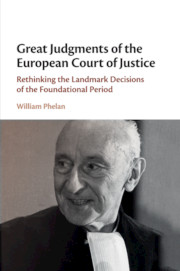 Great Judgments of the European Court of Justice
Great Judgments of the European Court of Justice Book contents
- Great Judgments of the European Court of Justice
- Great Judgments of the European Court of Justice
- Copyright page
- Epigraph
- Contents
- Tables
- Acknowledgements
- Abbreviations
- European Court of Justice Cases
- Preamble and Selected Provisions of the Treaty of Rome
- Equivalence Table of Treaty Articles
- Introduction
- 1 Pork Products, 1961
- 2 Van Gend en Loos, 1963
- 3 Costa v. ENEL, 1964
- 4 Dairy Products, 1964
- 5 International Fruit, 1972
- 6 Van Duyn, 1974
- 7 Simmenthal, 1978
- 8 Sheep Meat, 1979
- 9 Internationale Handelsgesellschaft, 1970
- 10 States and Individuals in the Great Judgments of the European Court of Justice, 1961–1979
- Bibliography
- Index
2 - Van Gend en Loos, 1963
Direct Effect
Published online by Cambridge University Press: 04 November 2020
- Great Judgments of the European Court of Justice
- Great Judgments of the European Court of Justice
- Copyright page
- Epigraph
- Contents
- Tables
- Acknowledgements
- Abbreviations
- European Court of Justice Cases
- Preamble and Selected Provisions of the Treaty of Rome
- Equivalence Table of Treaty Articles
- Introduction
- 1 Pork Products, 1961
- 2 Van Gend en Loos, 1963
- 3 Costa v. ENEL, 1964
- 4 Dairy Products, 1964
- 5 International Fruit, 1972
- 6 Van Duyn, 1974
- 7 Simmenthal, 1978
- 8 Sheep Meat, 1979
- 9 Internationale Handelsgesellschaft, 1970
- 10 States and Individuals in the Great Judgments of the European Court of Justice, 1961–1979
- Bibliography
- Index
Summary
This chapter discusses the Court’s 1963 judgment, Van Gend en Loos, where the Court declared that European law could be relied upon by private individuals before their national courts. The direct effect of European law is often understood as empowering private individuals and national courts, as supplementing the European Commission-initiated compliance procedure set out in Article 169 of the Treaty of Rome, and increasing the binding nature of European law. This chapter demonstrates that the direct effect of European law was also directly connected to the Court’s rejection of the possibility of inter-state retaliation within the European Economic Community. This is demonstrated both by advocacy of direct effect for other trade-related treaty systems, where reformers often wish to suppress retaliatory enforcement mechanisms, and by the writings of judge Lecourt, which demonstrate that this important aspect of direct effect was well recognized by one of the Court’s then most influential judges.
Keywords
- Type
- Chapter
- Information
- Great Judgments of the European Court of JusticeRethinking the Landmark Decisions of the Foundational Period, pp. 31 - 57Publisher: Cambridge University PressPrint publication year: 2019


